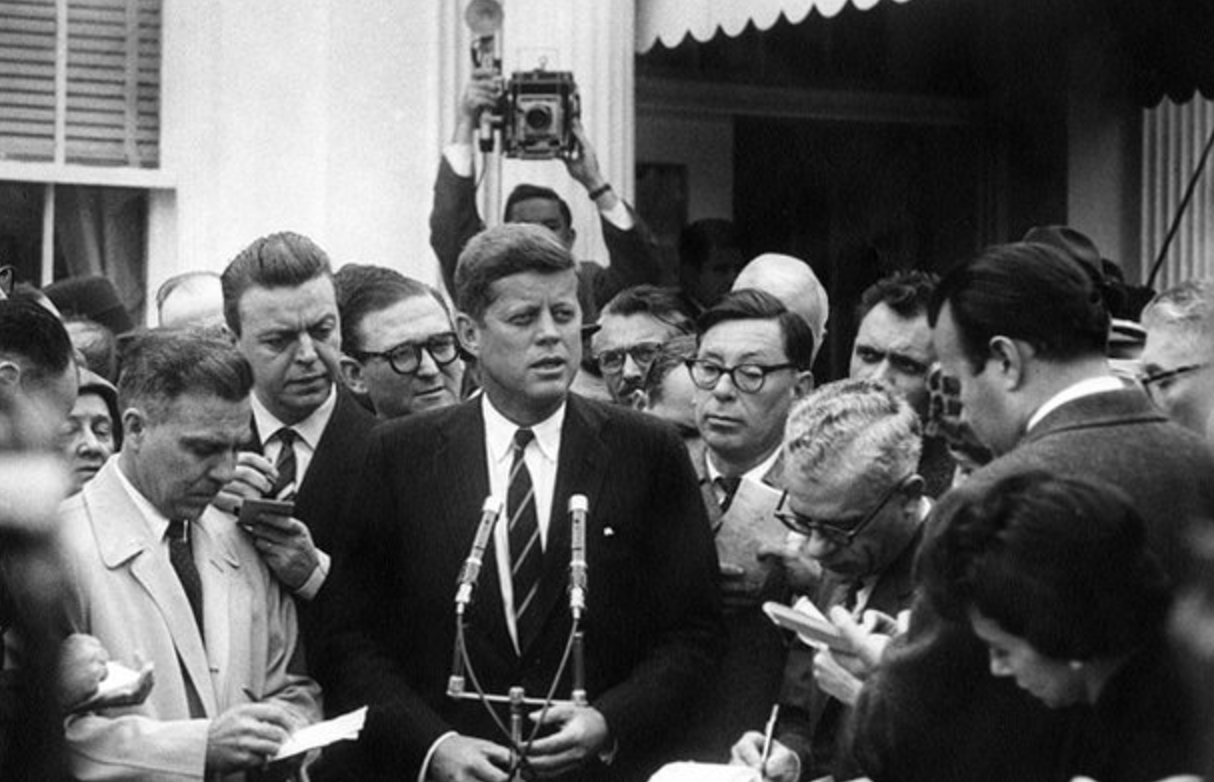For the past year, it seems as though every time the television (TV) is turned on, the coverage is dominated by politics. Without television as a medium for news, the world of politics would be a different place. TV allows politicians to manifest their beliefs, ideas and principles to people across the country accurately and efficiently. Seeing a politician live on TV ensures that citizens are familiar with each candidate’s personality and mannerisms as well as their political beliefs.
This concept, which is standard now, was barely heard of before John F. Kennedy took office. Kennedy was the first president to truly use TV as a form of media; he was the first president to conduct live press conferences making him seem more vulnerable and open towards the American people than any of his predecessors. Kennedy, an entertaining and eloquent speaker, seemed as though he was made to be on screen. In fact, Kennedy, along with his opponent Richard Nixon, participated in the first ever televised debate. An informal survey that was conducted after the debate proved that this new form of media was favorable for Kennedy; those who had watched the debate on TV were under the impression that Kennedy won the debate, while those who listened on the radio believed that Nixon won.
With the rising popularity of TV, many newspapers felt threatened as they were concerned that their reports were irrelevant since readers could now witness events themselves. However, while Kennedy’s use of the media revolved mostly around television, he still read print news himself. He understood the importance of independent media and believed the press was necessary even if he did not like what was said.
“There is a terrific disadvantage not having the abrasive quality of the press applied to you daily, to an administration, even though we never like it, and even though we wish they didn’t write it, and even though we disapprove, there isn’t any doubt that we could not do the job at all in a free society without a very, very active press,” Kennedy said.
Having at one point been a reporter himself, Kennedy befriended many journalists. His intimacy with certain reporters was in part motivated by genuine affection for them; however, it was mainly for political reasons, as he knew that the press had an important role in swaying the opinions of readers. One example was Benjamin Bradlee, the executive editor of the Washington Post, who had been a friend of Kennedy’s since early in his career. The personal relationships he formed with many reporters were unconventional and caused a lot of controversy. Some viewed it as an unfair practice that gave some correspondents an advantage, while some favored Kennedy’s friendliness with reporters.
In addition to this, the aspect of Kennedy’s administration that stirred the most controversy was his attempts to manage the press. By developing such strong relationships with certain reporters, he was able to better control the image of him that was painted by the press. Especially considering the number of exclusive interviews (which were rare for a president to conduct prior to this time) he gave, one can assume that Kennedy was able to manipulate the information that was presented to the public. The use of live press conferences also enabled Kennedy to avoid traditional press coverage and directly inform the public. However, unlike his predecessors, Kennedy and his administration acknowledged his management of the press and defended it.
During Kennedy’s presidency, the Assistant Secretary in charge of Public Information ordered that officials could only discuss unclassified information with the press if another official was present, or the Secretary was notified of the discussion. This was clearly done in order to limit the amount of information available to the American public regarding foreign policy and was a direct attempt to manage the press by Kennedy’s administration. Eventually, the order was canceled due to protest from correspondents; however, it was nonetheless an action by the government that cannot be justified even by the usual argument that it was for the sake of national security.
Kennedy aimed to control the press by utilizing the Federal Bureau of Investigation (FBI) to uncover the source of any unfavorable information that was released, particularly when it was released as a “leak.”
Whether directly or indirectly, Kennedy and his administration made a number of attempts to manage the press, many of which were successful, in part due to his use of television and reporters alike. Kennedy took advantage of the newfound popularity of TV to present himself to the public as candid and charismatic, securing the television’s role as a new form of media. He was unprecedented in his affinity with reporters, which stirred a lot of controversy surrounding those relationships and the advantages they gave Kennedy as well as the reporters. Moreover, what may be the most shocking aspect of the Kennedy administration is the blatant attempts to handle the press through placing limits on the information that is available and pursuing the sources of any information found to be displeasing. Although Kennedy was supportive of the press, his continuous efforts to manage his repute and the flow of information undermine his contributions to developing a new form of media.




































